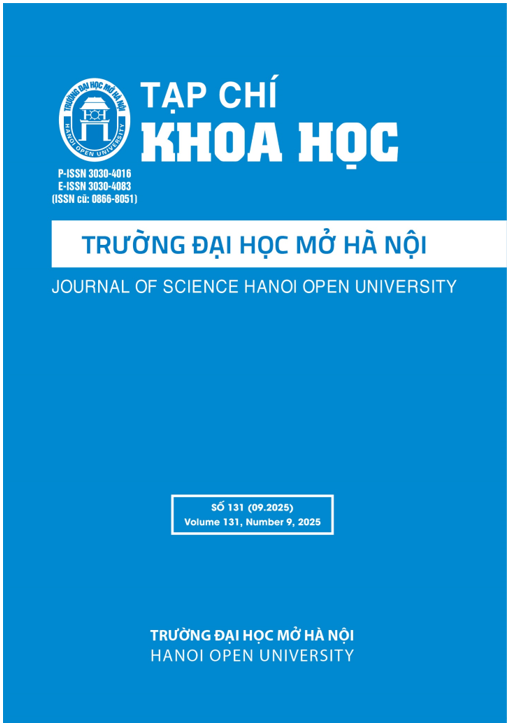IMPROVING ENGLISH SPEAKING SKILLS FOR NON-MAJOR STUDENTS THROUGH EXTRACURRICULAR ACTIVITIES AT HANOI OPEN UNIVERSITY
DOI:
https://doi.org/10.59266/houjs.2025.749Keywords:
L1: mother language, L2: foreign language, speaking skills, video recordingsAbstract
When learning English, the thing that students fear the most is speaking skills. Learning English to speak well and express your ideas to others is especially important. Therefore, students are very afraid of learning this skill. To teach this skill effectively and attractively to students, the research team used video recording, observation, and questionnaire methods to improve speaking skills for our students at Hanoi Open University. Our team consisted of two lecturers and seventy students. We had been using these methods for about 3 months. Using video recording in group activities helps students limit the use of their native language “L1” and increase the use of the second language "L2". Our research team wants students to develop self-confidence, learn while doing, and use the second language fluently, confidently, and happily when learning a foreign language. After the application sessions, the students' speaking ability has improved and become much more fluent. In addition, reviewing the recording helps students recognize grammar and pronunciation errors. This helps students to be serious about learning the language, as well as create fun video clips for them to review. Moreover, using additional questionnaires helps lecturers and students realize their goals and orient their own interests when teaching and learning the language. Students' presentation and speaking skills have improved, especially the use of their native language in group activities as well as in class. This helps them love the subject and communicate confidently when participating in extracurricular activities.
References
[1]. Afifah, N., & Lestari, D. (2019). Video Clips to Enhance the Development of The Students’ Speaking Skill. Linguistic, English Education and Art (LEEA) Journal, 3(1), 61-76. https:// doi.org/10.31539/leea.v3i1.893.
[2]. Campbell, L. O., & Cox, T. (2018). Digital Video as a Personalized Learning Assignment: A Qualitative Study of Student Authored Video using the ICSDR Model. Journal of the Scholarship of Teaching and Learning, 18(1), 11-24. https://doi.org/10.14434/ josotl.v18i1.21027.
[3]. Dzakiah, D., Assiddiq, M. A., & Mustari, S. H. (2020). Smartphone Video Recording As A Learning Tool To Improve Indonesian EFL Students’ Speaking Performance. Indonesian EFL Journal, 6(2), 157. https://doi. org/10.25134/ieflj.v6i2.3384.
[4]. Iskru, V. V., & Schulz, J. (2020). How Postgraduate Students Use Video to Help Them Learn. Contemporary Educational Technology, 12(2), ep276. https://doi.org/10.30935/cedtech/8400.
[5]. Kondal, B. & Prasad, D. (2020). Effectiveness of Video Recording towards Developing Speaking Skills. Waffen-Und Kostumkunde Journal, 11(9), 42-47. https://www.researchgate. net/ publi cat ion/344674171_ Effectiveness_of_Video_Recording_ towards_Developing_Speaking_Skills.
[6]. Le, V. H. H., & Nguyen, H. N. (2021). Mobile Phones’ Video Recording Tool. International Journal of Computer- Assisted Language Learning and Teaching, 11(2), 16-32. https://doi. org/10.4018/ijcallt.2021040102.
[7]. Manggolo, N. S. K. H., Nugrahaeni, D. A., Normawati, A., & Khusniyati, N. N. (2023). SVR (Self-Video Recording) Technique to Enhance Self-Confidence in English Speaking Proficiency. Metathesis: Journal of English Language, Literature, and Teaching, 7(2), 161-173. https://doi. org/10.31002/metathesis.v7i2.1124.
[8]. Morales, L. X. R., & Vaca-Cárdenas, M. (2023). Methods, techniques, and strategies to motivate students of English as a foreign language to improve the speaking skill. Kronos - the Language Teaching Journal, 4(1), 54-70. https://doi.org/10.29166/kronos. v4i1.4259.
[9]. Nguyen, T. P. (2024). Video Recording in EFL Learners’ Speaking Skills Development: A Literature Review. International Journal of AI in Language Education, 1(2), 52-76. https://doi. org/10.54855/ijaile.24124.
[10]. Taş, Ş. (2024). Improving students’ pronunciation skills through watching videos and audio recordings. Erbakan.edu.tr; Necmettin Erbakan Üniversitesi, Eğitim Bilimleri Enstitüsü. https://acikerisim.erbakan. edu.tr/items/11fe626f-4902-4d3d- b05a-aa851f82fc27.
[11]. Vu, H. T., & Nguyen, H. H. (2024). Challenges to Vietnamese Students Learning to Speak English. Academia Lasalliana Journal of Education and Humanities, 5(2), 41-52. https://doi. org/10.55902/oggy5139.
[12]. Yusof, N., & Abugohar, M. A. (2017). Teachers’ Attitudes towards the Use of Extracurricular Activities in Enhancing Students’ Speaking Skills. International Journal of Academic Research in Progressive Education and Development, 6(3). https://doi. org/10.6007/ijarped/v6-i3/3168.
